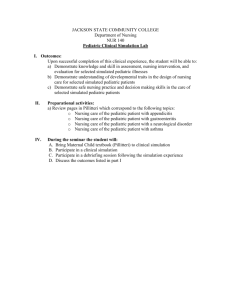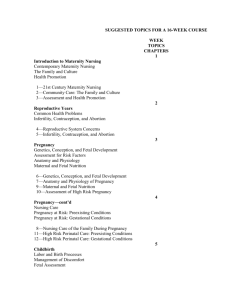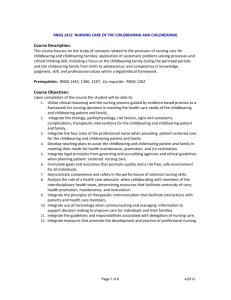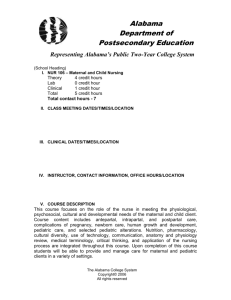HNUR_2745_MS - Baton Rouge Community College
advertisement
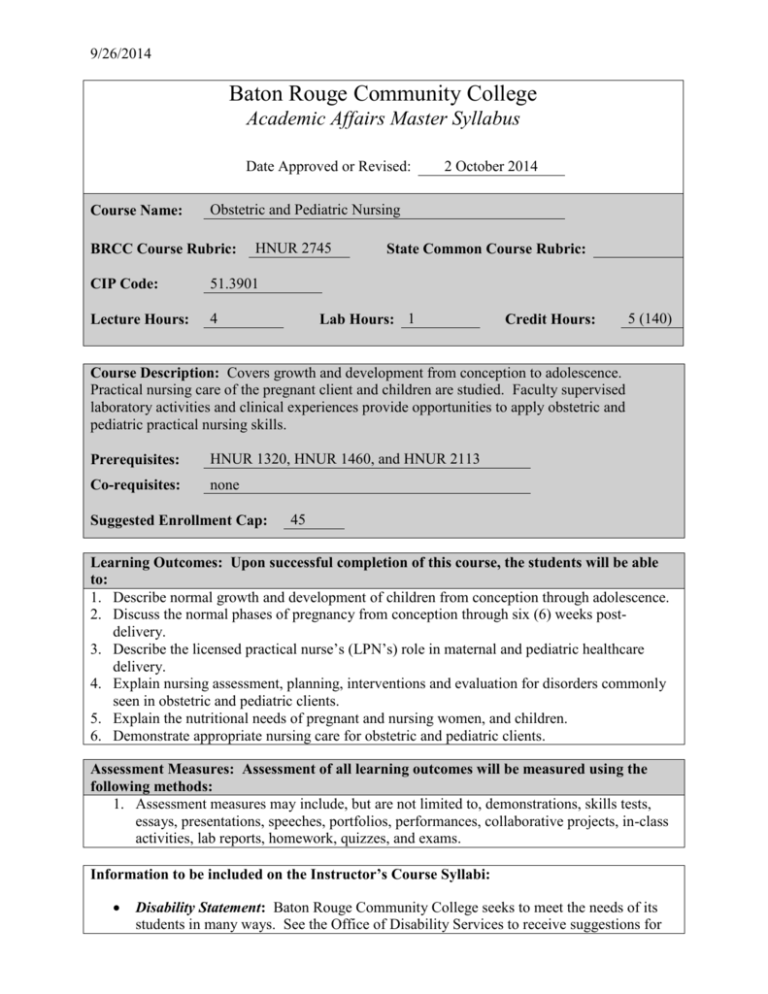
9/26/2014 Baton Rouge Community College Academic Affairs Master Syllabus Date Approved or Revised: Course Name: 2 October 2014 Obstetric and Pediatric Nursing BRCC Course Rubric: HNUR 2745 CIP Code: 51.3901 Lecture Hours: 4 State Common Course Rubric: Lab Hours: 1 Credit Hours: 5 (140) Course Description: Covers growth and development from conception to adolescence. Practical nursing care of the pregnant client and children are studied. Faculty supervised laboratory activities and clinical experiences provide opportunities to apply obstetric and pediatric practical nursing skills. Prerequisites: HNUR 1320, HNUR 1460, and HNUR 2113 Co-requisites: none Suggested Enrollment Cap: 45 Learning Outcomes: Upon successful completion of this course, the students will be able to: 1. Describe normal growth and development of children from conception through adolescence. 2. Discuss the normal phases of pregnancy from conception through six (6) weeks postdelivery. 3. Describe the licensed practical nurse’s (LPN’s) role in maternal and pediatric healthcare delivery. 4. Explain nursing assessment, planning, interventions and evaluation for disorders commonly seen in obstetric and pediatric clients. 5. Explain the nutritional needs of pregnant and nursing women, and children. 6. Demonstrate appropriate nursing care for obstetric and pediatric clients. Assessment Measures: Assessment of all learning outcomes will be measured using the following methods: 1. Assessment measures may include, but are not limited to, demonstrations, skills tests, essays, presentations, speeches, portfolios, performances, collaborative projects, in-class activities, lab reports, homework, quizzes, and exams. Information to be included on the Instructor’s Course Syllabi: Disability Statement: Baton Rouge Community College seeks to meet the needs of its students in many ways. See the Office of Disability Services to receive suggestions for disability statements that should be included in each syllabus. Grading: The College grading policy should be included in the course syllabus. Any special practices should also go here. This should include the instructor’s and/or the department’s policy for make-up work. For example in a speech course, “Speeches not given on due date will receive no grade higher than a sixty” or “Make-up work will not be accepted after the last day of class.” Attendance Policy: Include the overall attendance policy of the college. Instructors may want to add additional information in individual syllabi to meet the needs of their courses. General Policies: Instructors’ policy on the use of things such as beepers and cell phones and/or hand held programmable calculators should be covered in this section. Cheating and Plagiarism: This must be included in all syllabi and should include the penalties for incidents in a given class. Students should have a clear idea of what constitutes cheating in a given course. Safety Concerns: In some programs this may be a major issue. For example, “No student will be allowed in the safety lab without safety glasses.” General statements such as, “Items that may be harmful to one’s self or others should not be brought to class.” Library/ Learning Resources: Since the development of the total person is part of our mission, assignments in the library and/or the Learning Resources Center should be included to assist students in enhancing skills and in using resources. Students should be encouraged to use the library for reading enjoyment as part of lifelong learning. Expanded Course Outline: Maternal Child Nursing Care I. Culture and the childbearing family II. Nutrition in pregnancy and nursing III. Stages of pregnancy, labor, and delivery IV. Fetal development V. Physiological and psychological effects of pregnancy VI. Nursing assessment VII. Neonatal abnormalities VIII. Pharmacology in pregnancy IX. Common procedures and nursing interventions Pediatric Nursing Care I. Physical, cognitive, affective, and social development of the infant, child and adolescent II. Common diseases in children III. Nutrition from birth through adolescence IV. Nursing care/support for the infant, child and adolescent client V. Congenital disorders and developmental disabilities VI. Health Maintenance VII. Abuse and/or neglect VIII. Pharmacological treatment 2




